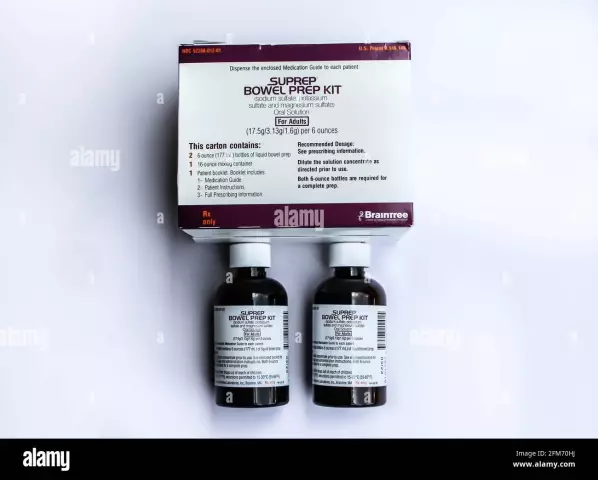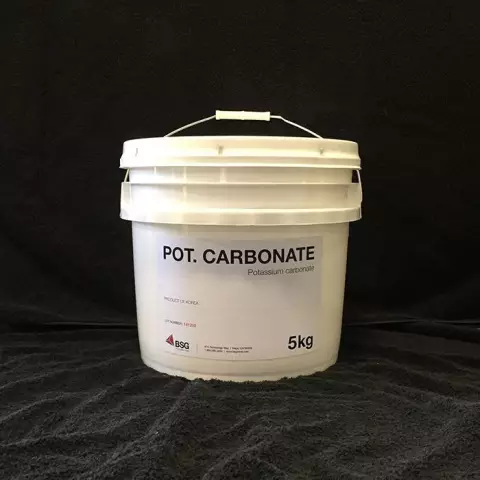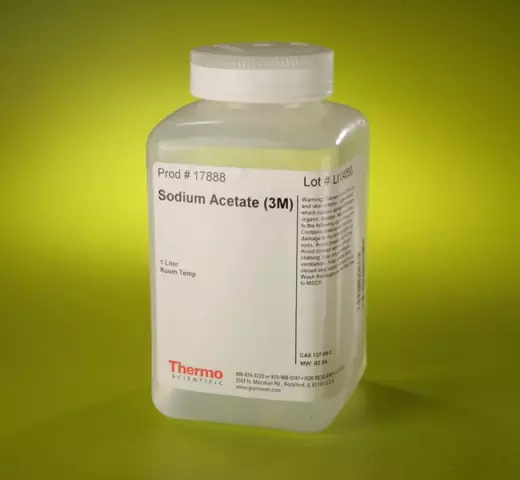- Author Rachel Wainwright wainwright@abchealthonline.com.
- Public 2023-12-15 07:39.
- Last modified 2025-11-02 20:14.
Potassium sulfate

Potassium sulfate is an inorganic compound with the chemical formula K2SO4.
As a food additive, potassium sulfate is called E515 and belongs to the group of emulsifiers that are necessary to create a homogeneous mixture of components immiscible in nature, for example, water with oil or water with fat. Also E515 is used in industrial production of products for acidity regulation.
Potassium sulfate is a hard and bitter salt with a very high melting point (about 1078 ° C). It is a colorless rhombic crystal, readily soluble in water.
Obtaining potassium sulfate
Potassium sulfate as a chemical compound has been known since the early 14th century thanks to the chemists Boyle, Glauber and Tacheus.
In nature, potassium sulfate is found in deposits of potassium salts. In addition, it is present in the waters of salt lakes, however, in most cases, with various impurities. Pure potassium sulfate is relatively rare in nature. Its most famous natural source is the mineral arcanite in the form of white or transparent crystals, which is found in California (USA).
Obtaining potassium sulfate is possible from natural minerals containing it. These include chenite, cainite, leonite, syngenite, glaserite, langbeinite, and polyhalite.
In laboratory practice, to obtain potassium sulfate, reactions with potassium oxide, with weak or unstable acids, and some others are used.
Potassium sulfate properties
Potassium sulfate is a necessary compound for the body, since it is involved in the process of delivering oxygen to cells.
Lack of potassium sulfate affects not only the condition of the skin and hair, but also the general tone of the body, which manifests itself as fatigue.
In foods, potassium sulfate is found in seaweed, spinach, cheese, beets, lean beef, bananas, citrus fruits (lemons and oranges), almonds.
Potassium sulfate as a chemical compound is unsafe for the body in the following cases:
- In case of contact with eyes and skin, mechanical irritation is possible;
- If a large amount of potassium sulfate is swallowed, irritation of the gastrointestinal tract is possible;
- If the compound is inhaled, irritation of the respiratory tract is possible.
The use of potassium sulfate in the food industry

In the industrial production of food, potassium sulfate as an additive E515 is most often used as a salt substitute, as well as:
- As a nutrient medium for the preparation of rye starter cultures and yeast of a liquid consistency;
- As a regulator of acidity in beverages;
- As a source of mineral nutrition.
Potassium sulfate in moderation is good for the body. However, excessive amounts can lead to indigestion, irritation of the entire digestive tract, and in some cases, poisoning of the body.
Potassium sulfate use
Potassium sulfate is widely used in agriculture as a chlorine-free fertilizer. The efficiency of potassium sulfate solution is highest on sod-podzolic and peat soils, which are poor in potassium. It is also used as an alternative to chlorine fertilizers for growing tobacco, potatoes, grapes, flax, citrus fruits.
On chernozem soils, potassium sulfate solution is used, as a rule, for crops that assimilate a lot of sodium and potassium, including sunflower, sugar beet, fruit, various root crops and vegetables.
The most effective solution is potassium sulfate in combination with nitrogen and phosphorus fertilizers.
Potassium sulfate is also used:
- In pharmacology - as a raw material for the production of dietary supplements;
- In glass production.
Found a mistake in the text? Select it and press Ctrl + Enter.






